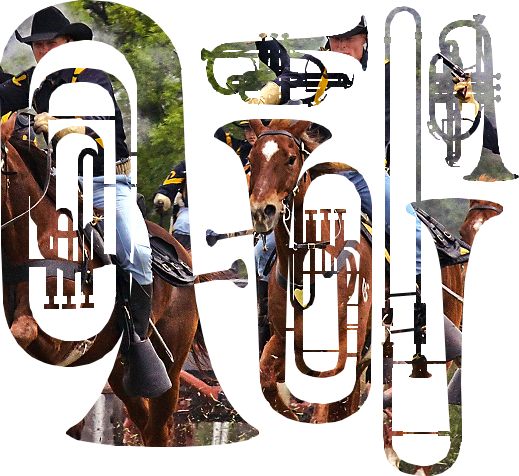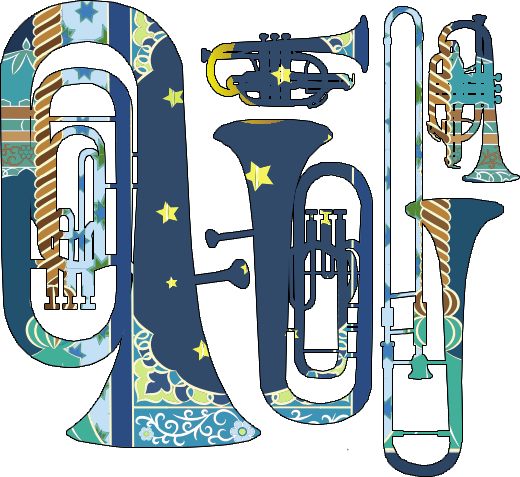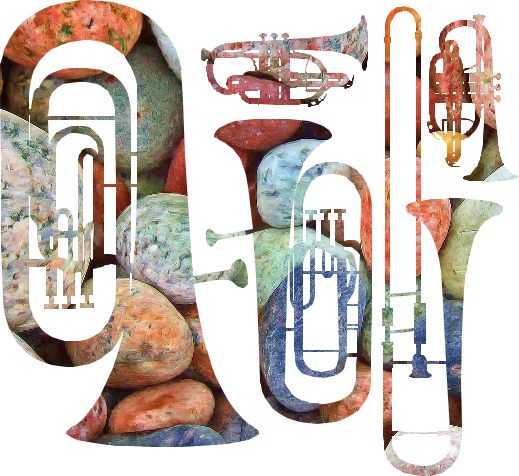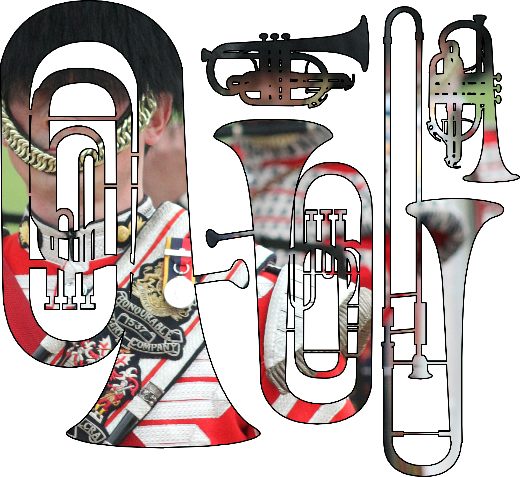Results
-

Cavalry Soldier March | Baritone Feature | Dario Salvi
A lively opening march by J.O.Brockenshire featuring the baritone section, arranged by Dario Salvi. The Cavalry Soldier March allows the baritones a chance to step forward and show off their dexterity. Often overshadowed by the euphoniums, this arrangement provides us with a nice change of tone. With support on the melody by flugelhorn The Cavalry Soldier will add to your 'March library' with something a bit different for your audience. Instrumentation: Soprano, Solo, Repiano, 2nd and 3rd Cornets Flugelhorn Solo, 1st and 2nd Tenor Horns 1st and 2nd Baritone 1st, 2nd and Bass Trombone Solo and 2nd Euphonium Eb and Bb Basses Drum Kit ISMN: 979-0-708127-88-8
-

Dardanella | Bernard & Black arr. Dario Salvi
'Oh Sweet Dardanella, I love your harem eyes. I'm a lucky fellow, to capture such a prize'Dardanella was written in 1919 and became one of the most popular songs of the 1920's selling 13 million copies, going on to become a huge jazz standard covered by the likes of Louis Armstrong and Bing Crosby amongst others.This arrangement for Brass Band by Dario Salvi takes us back to the most famous version of 1920 sung by Vernon Dalhart and Gladys Rice, where the opening calls to mind the sounds of a fairground.Dario's arrangement moves between styles with an almost clockwork sound at one point changing to laid back swing beat at another, all supporting this cheerful melody. An excellent programme filler.Instrumentation:Soprano, Solo, Repiano, 2nd and 3rd CornetsFlugelhornSolo, 1st and 2nd Tenor Horns1st and 2nd Baritone1st, 2nd and Bass TromboneSolo and 2nd EuphoniumEb and Bb BassesPercussion parts:Drum KitXylophoneISMN: 979-0-708127-87-1
-

Gymnopedie No 1 | Satie arr. Leigh Sharpe
The Gymnopedies by Erik Satie are three piano compositions of extraordinary beauty. Gentle, eccentric pieces which defied the classical tradition. The name Gymnopedie is thought to be a reference to Satie's joke at a party when, concerned by his lack of formal qualifications, on being asked his profession, he replied Gymnopaedist - which means - 'naked athlete'.Instrumentation:Soprano, Solo, Repiano, 2nd and 3rd CornetsFlugelhornSolo, 1st and 2nd Tenor Horns1st Baritone1st, 2nd and Bass TromboneSolo and 2nd EuphoniumEb and Bb BassesPercussion parts:1: Glockenspiel2: CymbalsISMN: 979-0-708127-86-4
-

La Calinda | Delius arr. Leigh Sharpe
Taken from the opera 'Koanga' by Frederick Delius. Koanga is the hero of the opera, an African prince and voodoo priest stolen away and now working as a slave on a Mississippi plantation who falls in love with a fellow slave; Palmyra.This piece is a faithful arrangement of Delius's masterpiece for Brass Band, and features a well loved and catchy lyrical theme. La Calinda is not a simple piece to play, but well worth investing in.An excellent concert piece.Instrumentation:Soprano, Solo, Repiano, 2nd and 3rd CornetsFlugelhornSolo, 1st and 2nd Tenor Horns1st and 2nd Baritone1st, 2nd and Bass TromboneSolo and 2nd EuphoniumEb and Bb BassesTimpaniPercussion:1.Tambourine, Floor Tom2.Glockenspiel3.VibraphoneISMN: 979-0-708127-91-8
-
 £16.03
£16.03Finale from Symphony No.3 (Organ Symphony) (Brass Band) Additional Parts
Saint-Saens' magnificent Finale from Symphony No.3 (widely known as the 'Organ Symphony') has here been arranged for brass band with optional organ by Kevin Norbury. It was recorded by The International Staff Band on its CD Manuscripts, although this version has been revised in places. Saint-Saens decided to add the organ and piano to his 3rd symphony as a pragmatic orchestration innovation. The composition of this symphony was probably started in 1885 and a first draft was completed in Prague in 1886. Saint-Saens later recalled its eventful genesis: 'The Symphony in C was three-quarters sketched out when I found it impossible to write the finale. I did not know how to resolve this situation, until one night I suddenly woke up and, in a sort of hallucination, I heard the whole finale, which I hastily wrote down in outline, knowing that if I went back to sleep without having put anything on paper, I would have forgotten it all the next day.' The symphony was first performed under the composer's direction at Saint James's Hall in London on May 19, 1886. This arrangement by Kevin Norbury can both function as a stand-alone brass band piece, and be performed with an organ by omitting the notes found in square brackets in the parts and score. To view a rolling score video please visit www.youtube.com/watch?v=OlUd_FppBY8 PDF download includes additional parts as listed below. Full set including score available here. Sheet music available from: UK - www.brassband.co.uk USA - www.cimarronmusic.com Difficulty Level: 1st Section + Length: 8.30 mins. Alternative Parts included in this download: Solo Horn F 1st Horn F 2nd Horn F 1st Baritone B.C. 2nd Baritone B.C. 1st Trombone B.C. 2nd Trombone B.C. Euphonium B.C. Tuba 1 B.C. (Bass Eb equivalent) Tuba 2 B.C. (Bass Bb equivalent)
In Stock: Estimated dispatch 1-3 working days
-

Galanthia | Turpin arr. William Hill
A bright bold and upbeat march - another great crowd please. The best known composition of the prolific William Turpin who lived in London at the turn of the 19th Century. Instrumentation: Soprano, Solo, Repiano, 2nd and 3rd Cornets Flugelhorn Solo, 1st and 2nd Tenor Horns 1st and 2nd Baritone 1st, 2nd and Bass Trombone Euphonium Eb and Bb Basses Snare Drum
-

Pride of the Wolverines | Sousa arr.William Hill
'The Pride of the Wolverines' is a superb but lesser known march from the pen of JP Sousa which deserves to be better known.The Wolverine is a stocky and muscular carnivore, closely resembling a small bear, which can be found in remote reaches of the Northern Hemisphere. The US state of Michigan uses the Wolverine as it's mascot because of its reputation for strength and ferocity out of proportion to its size.In the American Civil War, many particularly from Detroit joined the Michigan Brigade, nicknamed 'The Wolverines' by their famous leader General Custer.Instrumentation: Soprano, Solo, 2nd and 3rd Cornets Flugelhorn Solo, 1st and 2nd Tenor Horns 1st and 2nd Baritone 1st, 2nd and Bass Trombones Euphonium Eb and Bb Basses Percussion: Drum Kit
-

The Day Thou Gavest | Ellerton arr. Alwyn Green
This beautiful traditional hymn is masterfully arranged by Alwyn Green.The mellow melody opens on single Euphonium, before being joined by Baritone and Tenor horn.The sound expands, yet quietly and prayerfully as the band joins. The music crescendo's into a grand finale with timpani and cymbal accompaniment.A great choice for a hymn piece.InstrumentationSoprano, Solo, Repiano, 2nd and 3rd CornetsFlugelhornSolo, 1st and 2nd Tenor Horns1st and 2nd Baritone1st, 2nd and Bass TromboneEuphoniumEb and Bb BassesPercussion parts (2):1: Timpani2: CymbalISMN: 979-0-708127-03-1
-

The Gartan Mother's Lullaby | trad. arr. William Hill
"The Gartan Mothers Lullaby"Dusk is drawn and the Green Man's thorn is wreathed in rings of fog,Siabra sails his boat till morn, upon the starry bog.A leanbhan O, the pale moon hath brimmed her cusp in dew,And weeps to hear the sad sleep-tune, I sing O love of you.A lovely Irish melody from Co. Donegal; the lullaby of a mother to her child. The song refers to a number of figures in Irish mythology, places in Ireland and words in the Irish language.The best known recording of the song was made by Meryl Streep in 2000. Instrumentation:Cornet SoloistSoprano, Solo/Repiano, 2nd and 3rd Cornets Flugelhorn Solo, 1st and 2nd Tenor Horns 1st and 2nd Baritone 1st, 2nd and Bass Trombone Euphonium Eb and Bb Basses
-

The Sorcerer's Apprentice | Dukas arr. Alwyn Green
Most of us are familiar with the symphonic poem written by 19th century composer, Paul Dukas, which was inspired by an 18th century poem by Goethe in which the sorcerer's apprentice, desiring to save himself some work attempts to try his hand at his masters craft when things go terribly wrong!This version, arranged by Alwyn Green for Brass Band, captures the spirit of the original masterpiece in a complex and challenging score for Brass Band. It has all the drama, and vibrant energy of the Dukas masterpiece, brilliantly orchestrated for Brass Band.Listen to the piece played by Foresters Brass 2000, from their CD : 'Heritage' which can be obtained from the band.Instrumentation: Soprano, Solo, Repiano, 2nd and 3rd CornetsFlugelhornSolo, 1st and 2nd Tenor Horns1st and 2nd Baritone1st, 2nd and Bass TromboneEuphoniumEb and Bb BassesPercussion parts (4):1: Timpani2: Cymbal3: Glockenspiel4: VibraphoneISMN: 979-0-708127-01-7
